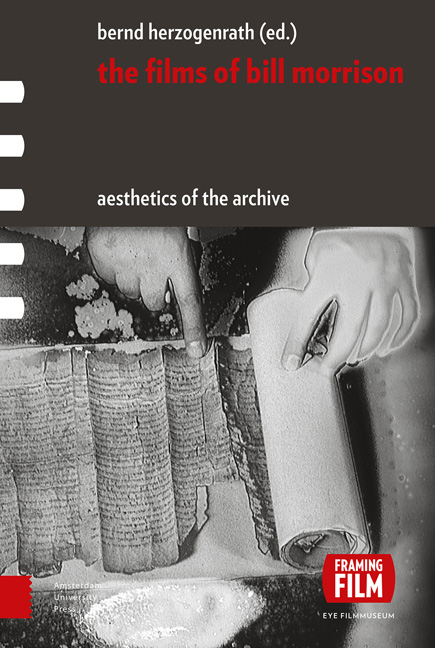Book contents
- Frontmatter
- Contents
- Acknowledgments
- Aesthetics of the Archive: An Introduction
- Chapter 1 Drafts and Fragments: Reflections around Bill Morrison and the Paper Print Collection
- Chapter 2 The Film of Her: The Cine-Poet Laureate of Orphan Films
- Chapter 3 Ghost Trip: Searching for Potential Myths
- Chapter 4 Decasia: The Matter | Image: Film is also a Thing
- Chapter 5 The Mesmerist: Illustrating the Return of the Repressed
- Chapter 6 Light is Calling: Celluloid Dreams
- Chapter 7 Gotham: Zoetrope: Block by Block
- Chapter 8 Outerborough: Early Cinema Revisited
- Chapter 9 The Highwater Trilogy: Thinking the Liquid – On the Ethics of Water and the Material Ecologies of Disaster and Ruination
- Chapter 10 Porch: Archives, Collective Memory, and the Poetics of Home Movies
- Chapter 11 The Future Lasts Long: The Romanov Lost Family Archives
- Chapter 12 Who by Water: Variations on Matter, Figures, Memory, and Mythology
- Chapter 13 Every Stop on the F-Train: Beyond and within the Restless Netherworld of (Manhattan’s) Mind
- Chapter 14 Spark of Being: Bachelor Machine
- Chapter 15 The Miners’ Hymns: Acts of Resurrection
- Chapter 16 Tributes – Pulse: A Requiem for the 20th Century: Death | Drive | Image
- Chapter 17 Just Ancient Loops: The Loops of Life in Intonation
- Chapter 18 The Great Flood: Water is Transparence Derived from the Presence of Everything
- Chapter 19 Re-Awakenings: Bill Morrison in Conversation
- Index of Film Titles
- Index of Names
- Index of Subjects
- Already Published
Chapter 8 - Outerborough: Early Cinema Revisited
Published online by Cambridge University Press: 12 December 2020
- Frontmatter
- Contents
- Acknowledgments
- Aesthetics of the Archive: An Introduction
- Chapter 1 Drafts and Fragments: Reflections around Bill Morrison and the Paper Print Collection
- Chapter 2 The Film of Her: The Cine-Poet Laureate of Orphan Films
- Chapter 3 Ghost Trip: Searching for Potential Myths
- Chapter 4 Decasia: The Matter | Image: Film is also a Thing
- Chapter 5 The Mesmerist: Illustrating the Return of the Repressed
- Chapter 6 Light is Calling: Celluloid Dreams
- Chapter 7 Gotham: Zoetrope: Block by Block
- Chapter 8 Outerborough: Early Cinema Revisited
- Chapter 9 The Highwater Trilogy: Thinking the Liquid – On the Ethics of Water and the Material Ecologies of Disaster and Ruination
- Chapter 10 Porch: Archives, Collective Memory, and the Poetics of Home Movies
- Chapter 11 The Future Lasts Long: The Romanov Lost Family Archives
- Chapter 12 Who by Water: Variations on Matter, Figures, Memory, and Mythology
- Chapter 13 Every Stop on the F-Train: Beyond and within the Restless Netherworld of (Manhattan’s) Mind
- Chapter 14 Spark of Being: Bachelor Machine
- Chapter 15 The Miners’ Hymns: Acts of Resurrection
- Chapter 16 Tributes – Pulse: A Requiem for the 20th Century: Death | Drive | Image
- Chapter 17 Just Ancient Loops: The Loops of Life in Intonation
- Chapter 18 The Great Flood: Water is Transparence Derived from the Presence of Everything
- Chapter 19 Re-Awakenings: Bill Morrison in Conversation
- Index of Film Titles
- Index of Names
- Index of Subjects
- Already Published
Summary
ABSTRACT
Morrison is an archaeologist of cinema. His Outerborough references not only the earliest years of cinema history but also perceptional mechanisms. Reworking a Biograph film from 1899, Morrison transforms the film document into a structuralist meditation on cinematic space that references American avant-garde films of the 1970s. Morrison also points to the fact that the birth of cinema coincides with the development of modern modes of transportation, both technologies radically altering human perception of space and time. Suddenly, the world becomes much smaller. Yet, through early cinema and its mechanisms of perception, which emphasized visual pleasure and spectacle, audiences were able to confront their fears of a constantly changing environment and leave the cinema unharmed.
KEYWORDS
American Mutoscope and Biograph Company, avant-garde, early cinema, stereo Vision
The invention of cinema coincides with the development of mass transportation and urbanization. In major cities like New York, Paris, and London, the acceleration of time manifests itself in a compacting of space in which humans, buildings, and transportation systems tumble over one another. The resulting fragmentation of vision catalyzes a change in perception, which is not only articulated through Modernist art, but also in moments of early cinema. Urbanization and the speed of modern transportation, however, also generate anxiety in individuals, afraid of losing control of their environment. Both the apparatus of cinema and mass transport expand the experience of space and time, allowing the world to appear much smaller, but also lead to a drastic increase in perceptual data processed by individuals. Through early cinema, which focusses on visual attractions and spectacle, audiences could safely confront their anxieties about the dangers of modern life and then exit the cinema renewed.
In Outerborough (2005), an eight-and-a-half minute reworking of New York to Brooklyn Across Brooklyn Bridge, an 1899 film produced by the American Mutoscope and Biograph Company, Bill Morrison meditates on the interrelationship between early cinema and avant-garde cinema, defining their commonality in the perception of movement through space and, simultaneously, the construction of cinematic space. Originally conceived of as silent, Morrison asked Todd Reynolds to compose a modern musical score for a live performance, benefitting the Filmmaker's Coop in New York in September 2005, leading to the creation of a sound version, as well as the original silent version (Morrison 2015, personal email).
- Type
- Chapter
- Information
- The Films of Bill MorrisonAesthetics of the Archive, pp. 137 - 150Publisher: Amsterdam University PressPrint publication year: 2017



